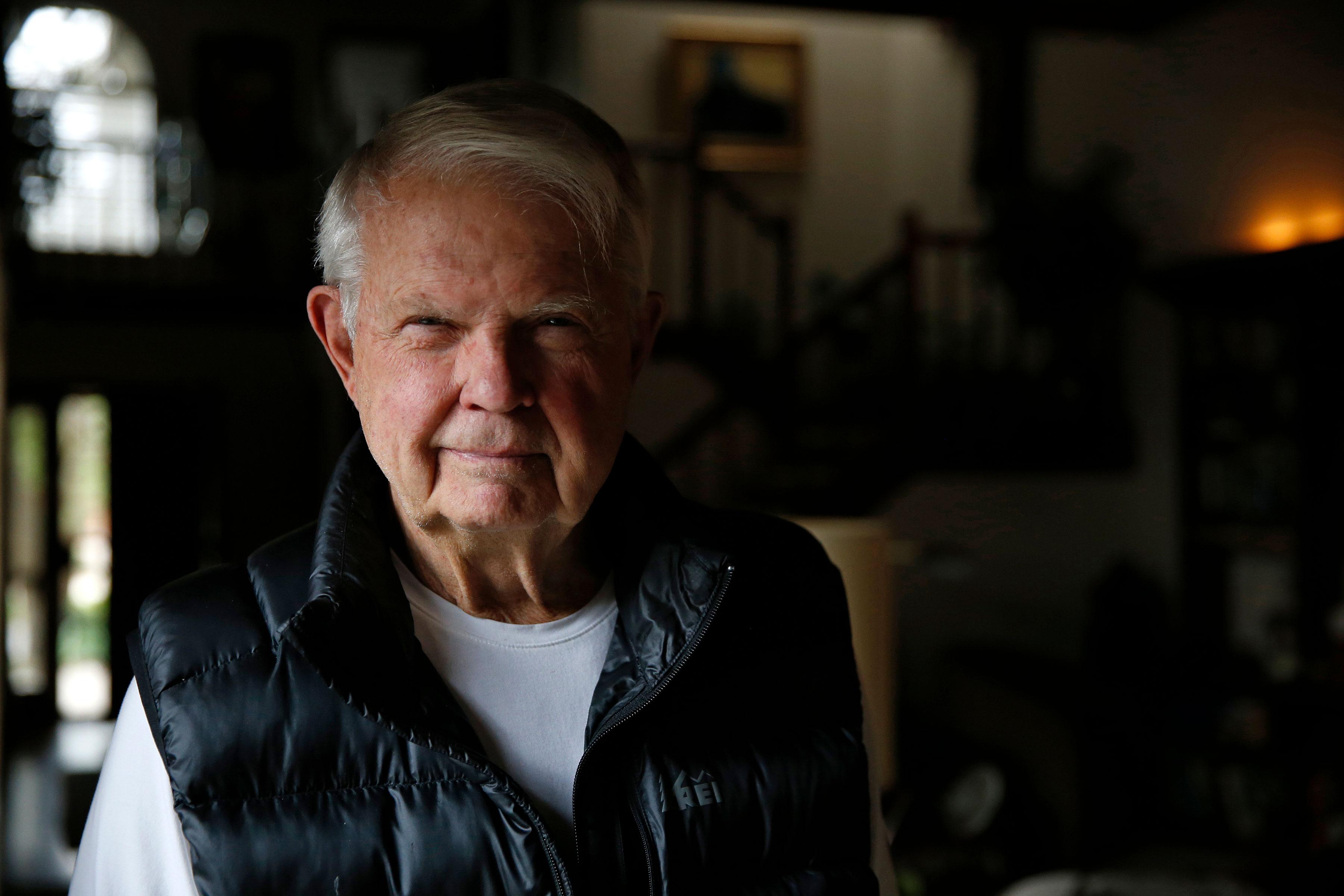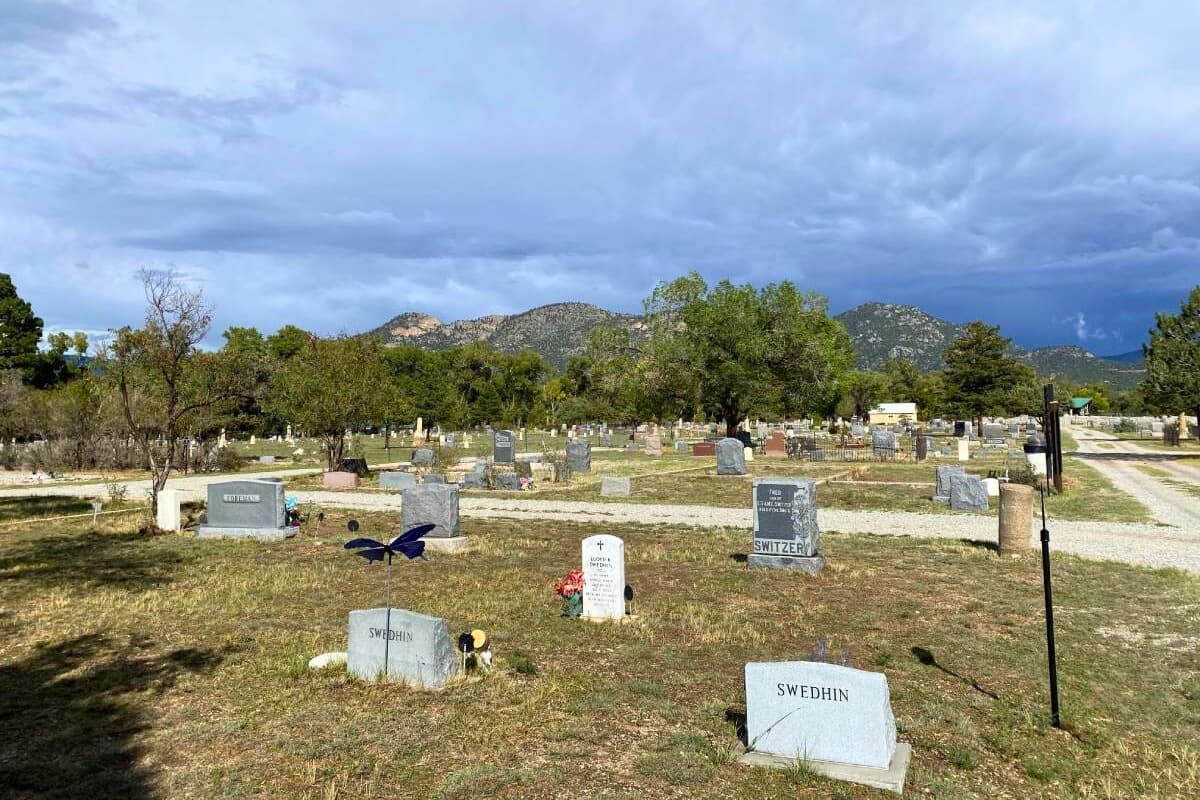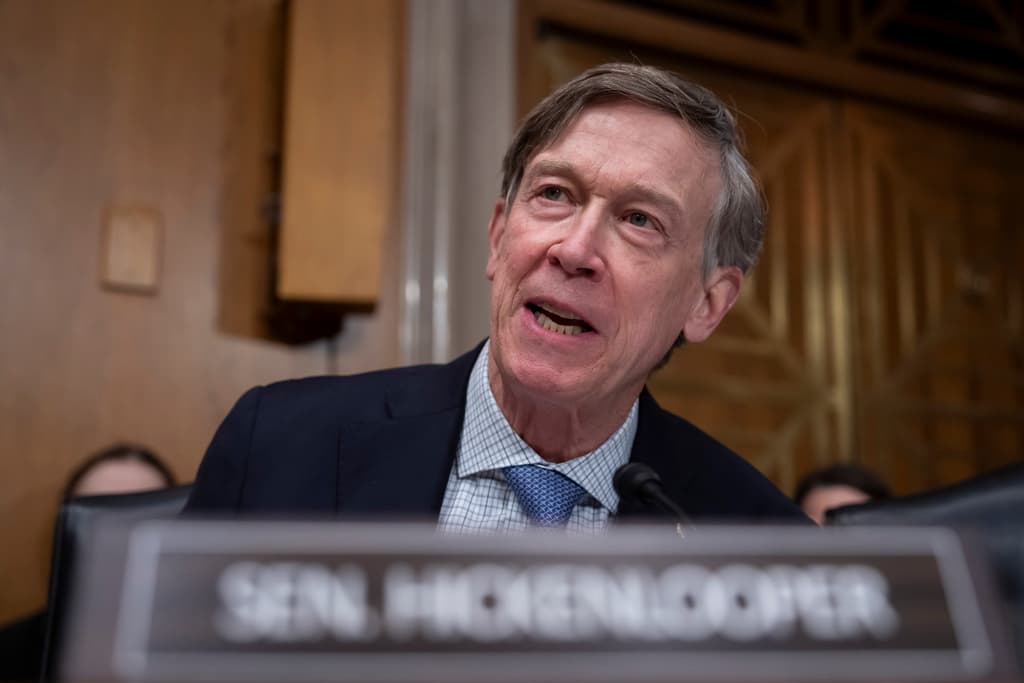
Updated 4:52 p.m.
Richard “Dick” Lamm, Colorado's governor from 1975 to 1987, died Thursday evening at age 85.
In a statement, his wife Dottie Lamm said, "With great sadness, but also gratitude for a life well lived and in service to his beloved Colorado, I want to share the news of the death of my husband, former Governor Richard D. Lamm.
"He would have turned 86 next Tuesday but passed away yesterday evening surrounded by his family, following complications from a pulmonary embolism earlier in the week."
Lamm was known for his sharp intellect, short temper, and love of debates and deep policy discussions.
“He was sort of a larger-than-life figure,” said former U.S Attorney Troy Eid, who worked closely with Lamm on civil service reform after Lamm left office. “He was himself. He didn't make any apologies for who he was and if he had controversial views and it sparked a lot of heat, he thought there could be some light that would come out of that as well.”
Lamm is perhaps best remembered nationally for leading the successful opposition to block the 1976 Winter Olympics from coming to Denver, making it the only place to reject the games after being selected as the host. Lamm felt the Olympics would leave behind hefty bills and environmental damage, while the state's businesses would get few benefits from the spectacle.
Lamm’s political career stretched across decades. He held elected office from 1964 to 1987, starting in the state legislature before going on to serve three terms as governor.
After leaving office, Lamm remained a singular — and often controversial — voice on the pressures facing the state. He became a public critic of the concepts of multiculturalism and cultural diversity and a strong proponent for limits on immigration.
Lamm’s views and political career were driven in large part by a combination of environmentalism and fiscal conservatism that centered on fears of an American West ravaged by over-development, climate change, and population growth.
“I think he was a man ahead of his time,” said former Sen. Ben Nighthorse Campbell, who defeated Lamm in the 1992 U.S Senate Democratic primary race. Campbell noted Lamm’s stands on everything from immigration to strip mining. “He was a very strong leader of the environmental movement before it was even popular … There were many things he spoke about before anybody else was speaking about it.”
People who worked closely with Lamm remember him as a demanding but rewarding boss.
“Dick more than anything taught me how to think strategically, how to take an issue and turn it on its side,” recalled longtime aide and staffer Maria Garcia Berry.
She said it felt like Lamm was grading his staff every day; when she and others suggested ideas, they had to come prepared, knowing he would pepper them with questions.
“You also had to make sure that you had an active reading list. If you walked into Dick Lamm’s office as a staff person, the first thing he’d say is ‘So what are you reading this week?’ We'd always want to find out what books he’s reading ... because he was a voracious reader.”
From abortion to open records to Olympics, Lamm started making marks early
In his early career, Lamm won attention for bills that put Colorado on the forefront of topics like abortion rights and public records. In 1967, six years before the Supreme Court decision on Roe-vs-Wade, he sponsored a state law that allowed abortions when a woman’s health was in jeopardy, as well as in limited cases for rape and incest. It was the first significant loosening of anti-abortion laws in the U.S. at that time.
"I was pushing on a half-open door. It gave way so much more easily than I ever dreamed it would," Lamm told the Associated Press about the law.
In the same year, Lamm co-sponsored the law that created the Colorado Open Records Act, or CORA, which allows the public to access documents created by state and local governments.
His later campaign to stop the 1976 Olympics epitomized his flexibility in appealing to Coloradans: He built a coalition made up of environmentalists, who worried about the effect of the Games, and fiscal conservatives, who opposed state funding for the event.
Lamm described himself as a “social moderate and a fiscal conservative,” the New York Times reported in a 1996 article.
After defeating the Olympics proposal, Lamm won the election to become the state’s 38th governor. To connect with voters, Lamm and his wife, Dottie, spent much of their time on the campaign trail on foot — literally walking around the state.
“I saw him walking through Alamosa with a group of Democrats behind and thinking, ‘Wow that’s a really interesting way to campaign,’” said Dick Wadhams, a longtime Republican political consultant.
But Lamm’s first term got off to a rough start, with some Democratic allies walking out of his inauguration to protest the lack of diversity in his leadership picks.
“It became very clear that there weren't going to be any African-Americans in the cabinet. And I thought that at that time that was outrageous,” said former state lawmaker and Denver mayor Wellington Webb, who helped stage the walk out.
“He told me later on, that was pretty painful. And he was really mad at me.”
But Webb said Lamm was not one to hold a grudge. The two men worked together closely over the years on many issues, including ensuring greater representation for African Americans on boards and commissions and in the Governor’s cabinet.
As governor, Lamm appointed the first woman and the first Hispanic Justices to the state supreme court while hiring the first Black and Hispanic department heads, according to the book Colorado Politics and Policy: Governing a Purple State.
Lamm’s temper also started him off on the wrong foot with the Colorado Press Association. He blasted reporters at an early briefing for failing to stand when he walked up to the podium.
“Stand up, dammit,” Lamm famously quipped.
Still, Fred Brown, who covered the statehouse for the Denver Post, said Lamm developed a good working relationship with the media, and was a fascinating person to cover.
“I always felt like I could talk with him and that he would give me a straight answer. I felt he was very honest in his opinions, and sometimes those opinions didn't fit the stereotype of what we expected of a liberal Democrat,” Brown said.
Opposition to immigration and multiculturalism is part of Lamm’s legacy
Lamm led Colorado at a time when the state was much more Republican than it is today and managed to win support from voters in both political parties. He also had to work across the aisle to get anything done; for most of his time in office, the GOP controlled both chambers of the Colorado legislature.
His pessimistic views on the state’s growing population, and a comment about older people having “a duty to die,” earned him a nickname: “Governor Gloom.”
“He spent a lot of time and effort on saying we're growing too fast. And that if we're not careful, we're going to have a string of cars from Cheyenne to Pueblo,” said Webb. “I think we're just about there, and he said this 40 years ago.”
Lamm opposed the creation of C-470 around Denver, which helped delay its construction for years. He also was an early opponent of oil-shale drilling, even as shortages drove demand for oil.
Lamm’s “gloomy” politics and philosophy went far beyond specific projects and policies, though. He took a dark view of the future, ringing the alarm throughout his career about environmental and fiscal threats facing the West.
In 1985, during his third term as governor, he warned that martial law might eventually be the “least onerous” choice amid inflation, immigration and the depletion of oil reserves. After leaving office, he spoke often about the perceived overpopulation of the planet and linked his environmental views to calls for strict limits on immigration.
“That unspoiled, beautiful Colorado that stirred me so deeply growing up has fallen prey to unchecked, immigration-induced population growth,” he wrote in 2016. “ … Can the mass importation of people into this country (people, of course, being the very agents of pollution), not lead to negative environmental effects?”
The state’s own analysis of census data in 2016 showed that only 12 percent of the people moving to Colorado at that time came from outside the country, with the rest arriving from other states.
And Lamm’s opposition to immigration went beyond environmental arguments; in 2005, in a controversial speech titled “I Have a Plan to Destroy America,” he inveighed against multiculturalism, arguing that viewing all cultures as equal and encouraging immigrants to “maintain their culture” could destroy the country.
A book by Lamm even stated that he would like to wave a magic wand “across the ghettoes and barrios of America and infuse the inhabitants with Japanese or Jewish values, respect for learning, and ambition.”
Those views drew anger from fellow Democrats. “To take our culture and our way of living and our whole being and try to turn us into something else, devalues who we are as Latinos and as blacks,” Veronica Barela, a Latina leader in Denver, told the Denver Post at the time. “The reality is that he is a hard-core racist.”
Reflecting on Lamm’s life, Webb said the comments were ill-advised.
“He was not perfect. I thought he made some tragic errors in judgment, as it related to dealing with immigration and the Latino community,” Webb said.
‘A towering figure in Colorado politics’
In remembering Lamm, many who worked with him over the years condemned his most controversial views, but also spoke of him as a mentor, and a good governor who left long-lasting positive impacts on Colorado.
“He was fun to get to know, but he really did have this love and passion and concern for the state,” said Eid, who traveled the state with Lamm during their work on civil service reform.
“He liked the rough and tumble, the full-contact sport of democracy. So he was not afraid to mix it up. He was not afraid to vehemently disagree and challenge people, but it was never personal.”
Lamm enjoyed helping the next generation of policy leaders and politicians and could be extremely encouraging. Nighthorse Campell recalled getting a call from Lamm right after he announced a run for the Colorado Legislature. “I was just amazed a governor would call a little old private citizen like me, but he was just that kind of person,” he said.
That call made a lasting impression on the then-neophyte political candidate. Nighthorse Campbell said Lamm told him to run a good race.
The two men stayed close, even when competing, as they did for the U.S. Senate in 1992. Lamm lost out to Nighthorse Campbell, but the friendship endured.
“I think everyone who knew Dick is going to miss him because he was a visionary and a gentleman and a towering figure in Colorado politics,” Nighthorse Campbell said.
Editors Note: A previous version of this story misspelled Maria Garcia Berry's last name.









